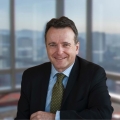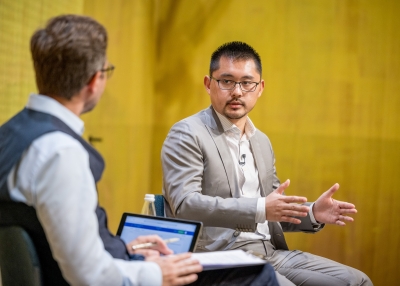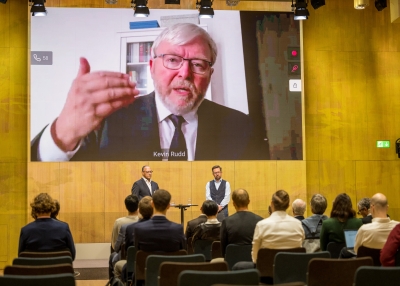Episode 3: Carbon Removal and Nature-Based Solutions
Innovative Responses in Australia and Southeast Asia
November 1, 2021 — John O’Brien, expert advisor to Australian governments and the cleantech sector; and Cherie Gray, global lead for sustainability and market development at Swiss Re, discuss the role nature-based solutions will play in decelerating climate change. This episode is moderated by Richard Francis, senior business development Manager at Swiss Re Institute. The event is part of Climate Change in the Indo-Pacific, a four-part series by Asia Society Switzerland and Swiss Re Institute exploring the effects of climate change on the Indo-Pacific and the world. (55 min., 20 sec.)
Our key takeaways
The state of affairs in Australia
Australia is one of the largest greenhouse gases emitters on a per capita basis in the world, facing increasing pressure from other countries to work towards mitigating climate change. The summer fires this year were disastrous. Whilst there has been relatively bad publicity around Australia, John O’Brien says that he has high hopes regarding Australia’s targets at COP26. So far, however, it appears that the Australian Prime Minister, Scott Morrison, has been rejecting suggestions from the country's allies to increase Australia's ambitions to tackle climate change.
Nature as a key asset
Cherie Gray comments that 55% of global capita is dependent on biodiversity and ecosystems services, including water, tourism, coral reef and irrigation, translating the need to protect nature as a key asset. Indeed, as nature degrades, so do our livelihoods and our economy. Gray also mentions the crucuial role that mangroves play: an estimated 15 million people on coast lines are protected from coastal tidal waves thanks to the presence of mangrove forests. In addition, mangroves store a significant higher amount of carbon than terrestrial forests do.
Carbon removal: a growing market
The practice of removing carbon from the air will remain a necessity for decades onwards, but there is no ‘one size fits all’ – a portfolio of different approaches is necessary to meet the needs of various regions. Gray notes that we need to ensure that the right solutions are used in the right context, and that there is a role for nature and tech to play together. Carbon removal is a growing market and will soon need to become as large as the oil and gas markets.
The role of technology and carbon capture
The Australian Prime Minister is betting a lot on technology and carbon capture storage solutions. There is not enough land to plant the amount of trees needed – which means that the scope of technological solutions, i.e. satellite technology, the monitoring of how many trees need to be replanted and how much carbon there is in the soil or in a leaf, needs to be enlarged. O’Brien notes that ‘technology is absolutely critical’ and needs to be combined with capacity building, financing, and regulations in order to be successful and yield the desired results.
Carbon pricing and regional cooperation
Carbon pricing was also a topic touched on during this episode. It is crucial to find a way to impose energy efficient pricing and work on different strategies to do enforce carbon pricing, and Gray says that there are a wealth of activities to invest in that may contribute to an effective response to issues posed by climate change. She also notes that there is an increasing number of bilateral agreements, for example a scheme with the ASEAN countries.
Contributed by Gen A Alumna Eléonore Aubry

John O'Brien
Partner, Energy Transition & Decarbonisation, Deloitte Financial Advisory, Australia
John has 30 years’ experience in the Australian and global clean energy and clean technology sectors and now leads Deloitte’s decarbonisation work in Australia. He is also Deloitte’s Global Lead for decarbonisation in the Mining and Metals sector. John started his career in the oil & gas industry in Scotland and Syria, engineering roles in London and Adelaide before joining Origin Energy in corporate development. In 2007, John established Australian CleanTech, a boutique advisory firm that led the development of the cleantech sector in Australia for ten years.
John is widely published with his last book, Visions 2100, launched at the Paris COP21 Climate Conference in 2015. He will be joining live from COP26 in Glasgow where he will be launching his latest book, Stories from 2030, which sets out practical steps of what is likely to happen locally and globally over the next decade.

Cherie Gray
Global Lead Sustainability & Market Development, Swiss Re
Cherie Gray is the Global Lead for Sustainability and Market Development, with Swiss Re's Public Sector Solutions business. Cherie works with governments, institutions, NGOs, and the insurance industry to create opportunities that support nature-based solutions and broader sustainability practices.
Cherie joined Swiss Re in 2017 as the Strategy & Insights Manager for Australia and New Zealand, then moved to Singapore to lead Business Transformation in the Asia region. Prior to Swiss Re, Cherie spent 13 years in primary insurance leading and transforming functions across the value chain, including strategy and planning, sales and distribution, product management and claims. Before insurance, she spent a number of years in marketing and consulting.
Cherie has an MBA, is a qualified Executive Coach and graduate of the Australian Institute of Company Directors.

Richard Francis
Senior Business Development Manager, Swiss Re Institute
Richard Francis is an international business development expert, currently contracted with the Swiss Re Institute on projects in China. He served as a Trade and Investment Commissioner at the Australian embassies to India and Russia and is fluent in Mandarin and Russian. He was the former Head of China Engagement at the Swiss Re Institute. Richard has wide experience in international higher education as the China Campus Dean of French business school SKEMA, Director of the Curtin University's Asia Business Research Centre in Australia and the Corporate Development Director of Greater China, CEE and CIS at leading Swiss business school IMD.


